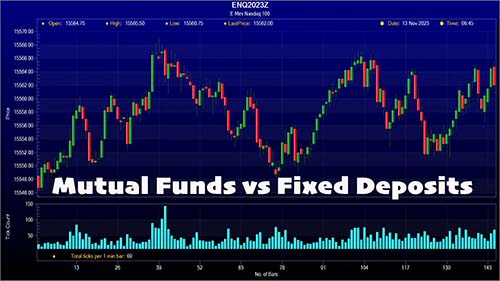In the ever-evolving world of investment, choosing the right avenue for your hard-earned money is crucial. For conservative investors, Fixed Deposits (FDs) and Mutual Funds have long been popular choices. Both are tried and tested investing methods but serve different financial goals and risk appetites. In 2025, as financial markets continue to evolve and interest rates fluctuate, it’sevaluating which investment option is better suited for your needs is essential.
This article will compare Mutual Funds and Fixed Deposits, focusing on factors like risk, returns, liquidity, tax implications, and other features, helping you make an informed decision about where to invest in 2025.
What Are Fixed Deposits?

Fixed Deposits (FDs) are low-risk investment instruments banks and financial institutions offer. Investors deposit a lump sum amount with the bank for a fixed tenure, usually ranging from a few months to several years. In return, the bank offers a predetermined interest rate, which remains fixed for the entire tenure. The investor receives the principal and interest at the end of the FD tenure.
Key Characteristics of Fixed Deposits:
- Low Risk: FDs are one of the safest investment options since they are backed by the bank or financial institution offering them. The risk of loss is almost negligible.
- Fixed Returns: The interest rate on FDs is predetermined and remains constant throughout the tenure, offering predictable returns.
- Liquidity: FDs are less liquid than savings accounts, they can still be broken prematurely for a penalty fee. However, premature withdrawals may also lead to lower interest earnings.
- Taxation: The interest earned on FDs is subject to tax based on the investor’s income tax bracket, and TDS (Tax Deducted at Source) is applicable for interest income above a certain threshold.
What Are Mutual Funds?
Mutual Funds pool money from multiple investors and invest it in a diversified portfolio of stocks, bonds, or other assets, managed by professional fund managers. These investments are riskier than FDs but have the potential for higher returns.
Mutual Funds are categorized into different types, including equity funds, debt funds, hybrid funds, and sector-specific funds, each catering to different risk profiles. The returns are not fixed and depend on the performance of the underlying assets in the fund’s portfolio.
Key Characteristics of Mutual Funds:
- Higher Risk: Mutual Funds, particularly equity-based funds, come with a higher level of risk as they are market-dependent. The value of investments can rise or fall, sometimes significantly, based on market conditions.
- Potential for High Returns: Although riskier, Mutual Funds offer the potential for higher returns, especially in the long term. Historically, equity funds have outperformed traditional instruments like FDs over extended periods.
- Liquidity: Mutual Funds are highly liquid. Fund units can be bought and sold quickly, though the returns are subject to market conditions at the time of redemption.
- Taxation: Mutual Funds’ tax treatment depends on the fund type and holding period. For equity funds, long-term capital gains (LTCG) are taxed 10% if held for over a year, while short-term capital gains (STCG) are taxed 15%. Debt Mutual Funds are taxed based on the investor’s tax slab, with benefits for long-term investments (holding period above three years).
Key Differences Between Mutual Funds and Fixed Deposits
Risk vs. Return
- Fixed Deposits: As mentioned, Fixed Deposits are considered low-risk investments. The returns are guaranteed and do not fluctuate, making them ideal for conservative investors seeking capital preservation. However, the returns are generally modest, typically between 5-7% per annum in India.
- Mutual Funds: Mutual Funds come with varying degrees of risk. Equity funds, for example, can be volatile and prone to market swings. However, these funds have historically provided higher returns (8-15% annually over long-term periods) than traditional instruments like FDs. For risk-averse investors, debt funds and hybrid funds offer a balance between risk and return.
Liquidity
- Fixed Deposits: FDs offer limited liquidity. You may face penalties or reduced interest if you need to access the money before the maturity date. Some banks provide premature withdrawal facilities, but the penalty can affect your returns.
- Mutual Funds: Mutual funds are highly liquid and can redeem units quickly (usually within a day or two). However, if you redeem from equity or sector-specific funds, the value may fluctuate based on the prevailing market conditions.
Taxation
- Fixed Deposits: The interest earned on Fixed Deposits is taxed at the investor’s income tax rate, with TDS deducted at source if the interest exceeds ₹40,000 (for individuals below 60 years of age). This can lead to a significant tax burden, especially for individuals in higher tax brackets.
- Mutual Funds: Mutual Funds have more favourable tax treatment, especially for long-term equity funds. Long-term capital gains from equity funds are taxed at 10%, and debt funds offer indexation benefits, making them tax-efficient for long-term investors. The tax rates are higher for short-term gains (holding period less than one year for equity, less than three years for debt).
Interest Rate vs. Market Dependent Returns
- Fixed Deposits: The returns on Fixed Deposits are known in advance, offering peace of mind to risk-averse investors. However, the return rates depend on interest rate trends set by the Reserve Bank of India (RBI) and can be lower than the returns from market-based instruments.
- Mutual Funds: Returns from Mutual Funds depend on the underlying assets’ performance. Equity funds, for example, can be volatile, offering higher returns during good market conditions and the risk of significant losses in a downturn.
Investment Horizon
- Fixed Deposits: FDs are suitable for short to medium-term goals. They are best for individuals who want to park their money for a fixed period and don’t require liquidity.
- Mutual Funds: Mutual Funds are better suited for long-term goals (5 years or more) due to their growth potential. Investors with a higher risk tolerance and looking for wealth accumulation over time will benefit more from investing in Mutual Funds.
What’s the Right Investment for You in 2025?
When to Choose Fixed Deposits
- Risk-Averse Investors: If you are a conservative investor with a low-risk tolerance, Fixed Deposits can be a safer choice. They offer stability, fixed returns, and the safety of the principal.
- Short-Term Goals: If you are saving for a short-term goal (like buying a car in 1-2 years), FDs might be more appropriate due to their predictable returns and low risk.
- Fixed Income Need: FDs can be ideal if you require regular income from your investment (e.g., senior citizens looking for a stable income stream) since the interest is paid at regular intervals.
When to Choose Mutual Funds
- Higher Return Expectations: If you are looking for higher returns and are willing to take on more risk, Mutual Funds, especially equity funds, are a better choice. These can offer significantly higher returns in the long term, primarily if the market performs well.
- Long-Term Goals: Mutual Funds are better suited for long-term financial goals like retirement planning, children’s education, or wealth creation. Equity Mutual Funds, in particular, have the potential to beat inflation and provide superior returns over time.
- Diversification: If you want exposure to a diversified portfolio of stocks, bonds, and other assets, Mutual Funds offer an easy way to do so without needing significant knowledge or effort in managing individual investments.
Conclusion
In 2025, Mutual Funds and Fixed Deposits remain solid investment options, but the choice depends on your financial goals, risk appetite, and time horizon. Fixed Deposits are safe, stable, and reliable, while Mutual Funds offer more significant growth potential with a higher level of risk.
If you seek safety and fixed returns in the near term, Fixed Deposits are the way to go. However, if you are focused on long-term wealth creation and are willing to accept some level of market risk, Mutual Funds, particularly equity funds, maybe the better option. Many investors choose a combination of both to balance risk and reward in their portfolio.
Summary:
- Fixed Deposits: Low risk, fixed returns, suitable for short-term or conservative investors, and taxed at the investor’s income tax rate.
- Mutual Funds: Higher risk, the potential for higher returns, better suited for long-term investors, and favourable tax treatment for long-term gains.
In 2025, your decision between these two investment options should be guided by your financial goals, risk tolerance, and investment horizon.



